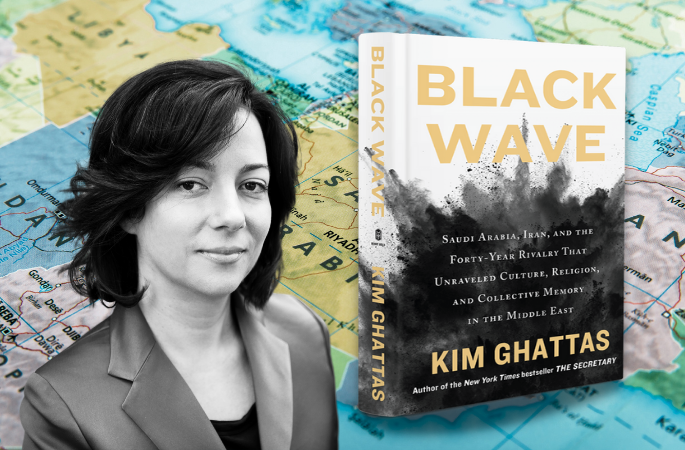A thoughtful narrative of the events in 1979 that influenced the Middle East and Southeast Asia
Black Wave, a book authored by Kim Ghattas, a Dutch – Lebanese journalist for the BBC for the past 20 years, hit the shelves on 17th January 2020, soon before the world came to a halt due to the Covid-19 pandemic. Kim, in her second book ‘Black Wave’, describes Saudi – Iran and the forty-year rivalry. She explains the impact of the 1979 Iranian Revolution on the Middle East, Iraq, Lebanon, Egypt, Pakistan and Afghanistan. In black wave, Kim describes the three events which occurred in 1979 that changed the Middle East and Southeast Asia.
The three events she mentions in her book are:
The Iranian Revolution was conceived and created by Ayatullah Khomeini.
An attack led by the Saudi Fundamentalist group on the Grand Mosque of Mecca.
The Soviet invasion of Afghanistan.
These were three separate events, however, they had a bearing on the religious-political landscape of the Middle East and five other countries. The Iranian revolution and the exile of Mohammad Reza Shah Pahlavi paved the way for theocratic Shia Iran. The Mecca offensive hardened ‘Wahabi Islam’. With the Soviet incursion, Afghanistan became the first battleground of transnational Jihad with multiple partners in the playground.
Black Wave is the recount of her 20 years of reporting experience in the Middle East. The book is a combination of her knowledge and in-depth research she carried out in explaining the changes which happened in the aftermath of 1979. She starts her book with a question: What happened to us?’ The next comes ‘Cassette Revolution’ where she explains situations in Lebanon, Iraq, Iran and France from 1977-1979. In chapter three ‘Bleeding Heart’ she describes Saudi Arabia in 1979 and how the events in that year changed the landscape of Saudi Arabia and the Middle East. Black Waves beautifully portrays 40 years of rivalry between Saudi Arabia, Iran and five other countries that were influenced by the Iranian revolution in 1979 and the 15 characters involved in the book.
Black Waves lays greater emphasis on the year 1979 as it triggered Saudi – Iran rivalry to new heights, reversed regional politics and flared up quiescent sectarian tensions. The events as per the Black wave ultimately led to the rise of political Islam and the region witnessed an upswing in cultural intolerance.
Before the 1979 Iranian Revolution, the Middle East has witnessed many critical moments like the fall of the Ottoman Empire, the creation of Israel and the US invasion of Iraq, nonetheless, none of these occurrences influenced the Middle East as did the events in 1979. The ripple effects of the Iranian revolution proved disastrous for the Middle East and Southeast Asia. The incidents in 1979 procreate Sunni Saudi Arabia and Shia Iran, however, before 1979, both Saudi Arabia and Iran were competitive but allies. There was a sectarian division between the two but it mostly remained dormant. Sunni – Shia divide wasn’t prominent before 1979. They were friendly and major pillars of the US policy in the Middle East to counter the Soviet Union in Afghanistan.
Furthermore, Kim in Black wave illustrates Pakistan from 1978-86 when it went from a young imperfect democracy to a dictatorship. Black Wave describes Mawdudi’s ideas as the root cause of present-day political Islam, radical Salafism and Jihadism and his ideas correspondingly inspired Sunnis as well as Shias. The massacre of Shias & Sunni’s in Pakistan’s tribal area bordering Afghanistan in the summer of 1987 and this sectarian violence was an outcome of the Iranian Revolution and its clash with Saudi Wahhabism.
Ayatollah Khomeini had a vision and plans beyond Iran and beyond the Shia world and Khomeini in 1979 transformed Iran into the Islamic Republic with his concept ‘wilayat al-faqih. He openly challenged the ‘House of Saud’ for the role they played in the Muslim world. In reality, it wasn’t a battle between Saudia Vs Iran rather it was a clash between Persia Vs Arabia.
Both Saudi Arabia and Iran longed to take control of two Grand Mosques – Mecca & Medina. The vision and mission of Khomeini pushed Saudia to deploy all the soft power tools to garner the support of the Muslim world to its side. Both the rivals chased for regional hegemony in the Middle East and this illegal competition led to the arms race and ideological dominance. In the aftermath of 1979, both started to export their ideologies using religion as a tool. Besides, Kim in Black Waves argues that the Iran – Iraq war, mayhem in Afghanistan, the assignations & extremism in Pakistan, the civil war in Lebanon, Iraq, Syria and Yemen are all the offshoots of two parallel ‘Islamic revolutions’ in 1979. She rejects the West’s concept of Saudi – Iran rivalry as an age-old theological difference between Sunnis & Shiites.
Kim concludes the book by mentioning the planned assassination of Jamal Khashoggi, a Saudi dissident journalist and a columnist for the Washington Post. Khashoggi was dismembered in the Saudia consulate in Turkey in 2018. Black Waves lucidly portrays the incidents which transformed the Middle East that we see today. Through Black Wave, we see today’s Middle East from an Arab point of view.



